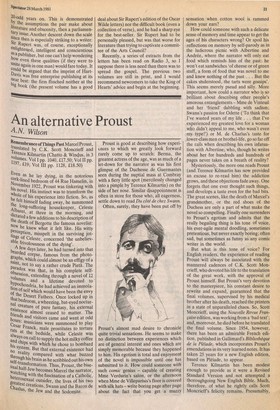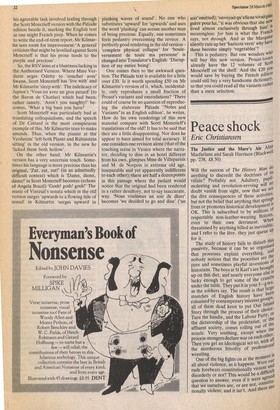An alternative Proust
A.N. Wilson
Remembrance of Things Past Marcel Proust, translated by C.K. Scott Moncrieff and Terence Kilmartin (Chatto & Windt's, in 3 volumes. Vol I pp. 1040, £17.50; Vol II pp. 1197, £19; Vol III pp. 1128, £18.50) Even as he lay dying, in the notorious cork-lined bedroom of 44 Rue Hamelin, in November 1922, Proust was tinkering with his novel. His instinct was to transform the Whole of his experience into fiction. So, as he felt himself fading away, he summoned the long-suffering housekeeper, Celeste Albaret, at three in the morning, and dictated a few additions to his description of the death of Bergotte the famous novelist: now he knew what it felt like. His witty peree Plion, misspelt in the surviving jottings of Celeste, concerned 'the unbelievable frivolousness of the dying'. A few days later, he had turned into that bearded corpse, famous from the photographs, which Could almost be an effigy of a Saint, not to say a rather crude Pieta. The paradox was that, in his complete selfobsession, extending through a novel of 12 volumes and a lifetime devoted to hYPochondria, he had achieved an immolation of self which would have been the envy of the Desert Fathers. Once locked up in that bedroom, a wheezing, bat-eyed nocturnal creature of pure fantasy, his external existence almost ceased to matter. The friends and visitors came and went at odd hours: musicians were summoned to play Cesar Franck, male prostitutes to torture rats at the bedside, while Celeste was always on call to supply the hot milky coffee and chips with which he chose to bombard his system. But that external existence had no reality compared with what buzzed through his brain as he scribbled out his own self-transformation. Thus, Proust, the bisexual half-Jew becomes Marcel the narrator, watching with the fascination of a Catholic, heterosexual outsider, the lives of his two greatest creations; Swann and the Baron de Charlus, the Jew and the Sodomite. Proust is good at describing how experitnces to which we greatly look forward rarely come up to scratch: Senna, the greatest actress of the age, was as much of a let-down for the narrator as was his first glimpse of the Duchesse de Guermantes seen during the nuptial mass at Combray with a fiery little spot (mercilessly changed into a pimple by Terence Kilmartin) on the side of her nose. Similar disappointment is often in store for those who, all eagerness, settle down to read Du cote de chez Swann.
Often, surely, they have been put off by Proust's almost mad desire to chronicle quite trivial sensations. He seems to make no distinction between experiences which are of general interest and ones which are simply memorable because they happened to him. His egotism is total and enjoyment of the novel is •impossible until one has submitted to it. How could someone with such comic genius — capable of creating Mine Verdurin's salon, or the afternoon when Mme de Villeparisis's floor is covered with silk hats — write boring page after page about the fact that you get a muzzy sensation when cotton wool is rammed down your ears?
How could someone with such a delicate sense of memory and time appear to get the ages of his characters wrong? Or spoil his reflections on memory by self-parody as in the ludicrous picnic with Albertine and Andree, where the narrator will only eat food which reminds him of the past: he won't eat sandwiches 'of cheese or of green stuff, a form of food that was novel to me and knew nothing of the past . . . But the cakes thiderstood, the tarts were gossips'.
This seems merely pseud and silly. More important, how could a narrator who is so brilliant about describing other people's amorous entanglements Mme de Vinteuil and her 'friend' dabbling with sadism; Swann's passion for Odette (`To think that I've wasted years of my life . . . that I've experienced my greatest love for a woman who didn't appeal to me, who wasn't even my type!) or M. de Charlus's taste for lower-class men or brothel-life, go so far off the rails when describing his own infatuation with Albertine; who, though he writes about her for hundreds and hundreds of pages never takes on a breath of reality? Mysteriously, the more one reads Proust (and Terence Kilmartin has now provided an excuse to re-read him) the addiction grows, and these objections fade away. One forgets that one ever thought such things, and develops a taste even for the bad bits. The great scenes, like the death of Marcel's grandmother, or the red shoes of the Duchess are only a part of what make the novel so compelling. Finally one surrenders to Proust's egotism and admits that the really beguiling thing is his tone of voice, his ever-agile mental doodling, sometimes pretentious, but never exactly boring; often sad, but sometimes as funny as any comic writer in the world.
But what is this tone of voice? For English readers, the experience of reading Proust will always be associated with the mannered cadences of C.K. Scott Moncrieff, who devoted his life to the translation of the great work, with the approval of Proust himself. But Proust's very devotion to the masterpiece, his constant desire to rewrite and expand, guaranteed that the final volumes, supervised by his medical brother after his death, reached the printers in a state of unparalleled chaos. So, Scott Moncrieff, using the Nouvelle Revue Frangaise edition, was working from a 'bad text'; and, moreover, he died before he translated the final volume. Since 1954, however, there has been an admirable French edition, published in Gallimard's Bibliotheque de la Pleiade, which incorporates Proust's emendations in its very learned notes. It has taken 25 years for a new English edition, based on Pleiade, to appear.
Terence Kilmartin has been modest enough to provide as it were a Revised Standard Version and not attempted a thoroughgoing New English Bible. Much, therefore, of what he rightly calls Scott Moncrieff's felicity, remains. Presumably, his agreeable task involved leafing through the Scott Moncrieff version with the Pleiade edition beside it, marking the English text as one might French prep. When he comes to write the end-of-term report, Mr Kilmartin sees room for improvement:`A general' criticism that might be levelled against Scott Moncrieff is that his prose tends to the I purple and precious'.
So, the RSV aims at a bluntness lacking in the Authorised Version, Where Mme Ver durin urges Odette to 'coucher avec' Swann, Scott Moncrieff has 'live with' and Mr Kilmartin 'sleep with'. The indelicacy of Jupien's 'Vous eh avez un gros petard' (to the Baron de Charlus) which had been, rather tamely, 'Aren't you naughty!' becomes, 'What a big bum you have!'
Scott Moncrieff was particularly bad at translating colloquialisms, and the speech of Dr Cottard is the most conspicuous example of this. Mr Kilmartin tries to make amends. Thus, when the pianist at the Verdurins"left both Plante and Rubinstein sitting' in the old version, in the new he 'licked them both hollow'.
' On the other hand, Mr Kilmartin's version has a very uncertain touch. Sometimes his language is more precious than his original, `Zut, zut, zut!' (in an admittedly difficult context) which is 'Damn, damn, damn!' in Scott Moncrieff becomes (echoes of Angela Brazil) 'Gosh! gosh! gosh!' The music of Vinteuil's sonata which in the old version surges 'upwards in a flowing tide of sound' in Kilmartin 'surges upward in plashing waves of sound'. No one who substitutes 'upward' for 'upwards' and uses the word 'plashing' can accuse another man of being precious. Equally, one sometimes feels pedantry overcoming the revisor. A perfectly good rendering in the old version — 'complete physical collapse' for 'bouleversement de toute ma personne' is changed into Translator's English: 'Disruption of my entire being'.
One comes then to the awkward question. The Pleiade text is available for a little over £30. Is it worth spending £50 on Mr Kilmartin's version of it, which, incidentally, only reproduces a small fraction of Proust's variants and emendations? 'There could of course be no question of reproducing the elaborate Pleiade "Notes and Variants" in an English edition', he writes. How do his own renderings of this new material compare with Scott Moncrieff's translations of the old? It has to be said that they are a little disappointing. Nor does he appear to have aimed for total accuracy. If one considers one revision alone (that of the touching scene in Venice where the narrator, deciding to dine in an hotel different from his own, glimpses Mme de Villeparisis and M. de Norpois in extreme old age, inseparable and yet apparently indifferent to each other); 'there are half a dozen points in this passage where the pedant would notice that the original had been rendered in a rather desultory, not to say inaccurate, way. 'Nous voulfimes un soir de diner' becomes 'we decided to go and dine' ('un soir'omitted); 'onvoyait qu'ellene vivaitplus guere pour lui,"it was obvious that she n0%,"/ lived almost exclusively through hint' 15 meaningless: for him is what the French says, not through. And as the Marquise silently cuts up her 'haricots verts' why have these become simply 'vegetables'? This is pedantry. But one wonders wh° will buy this new version. Proust-lovers already have the 12 volumes of Scott Moncrieff on the shelf. And the £20 yna would save by buying the French edition could still buy a very handsome dictionatY, so that you could read all the variants rather than a mere selection.











































 Previous page
Previous page